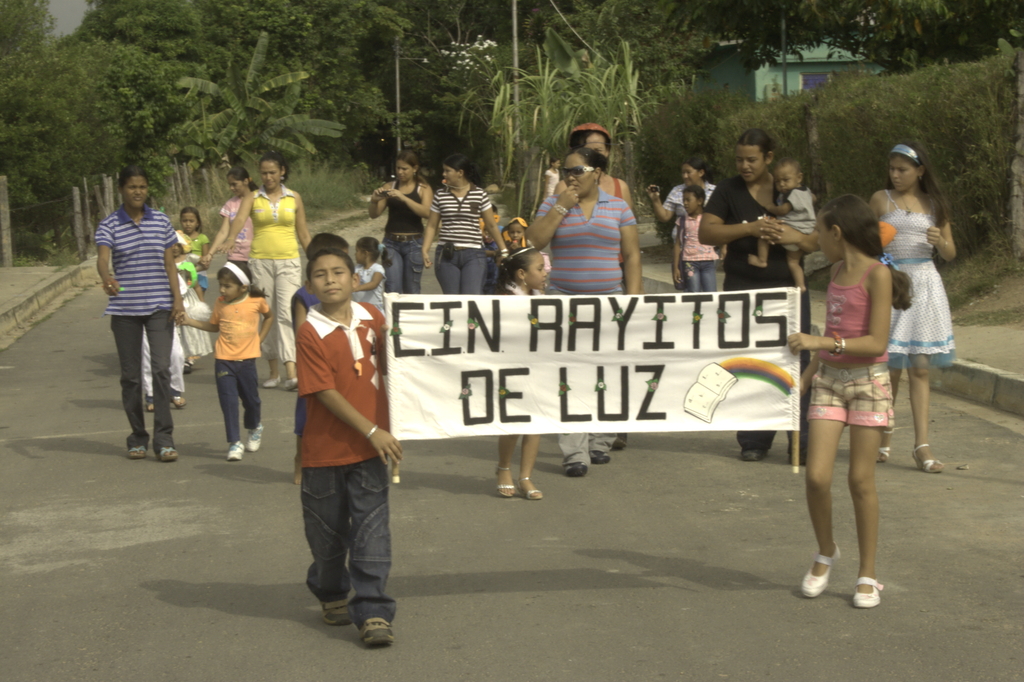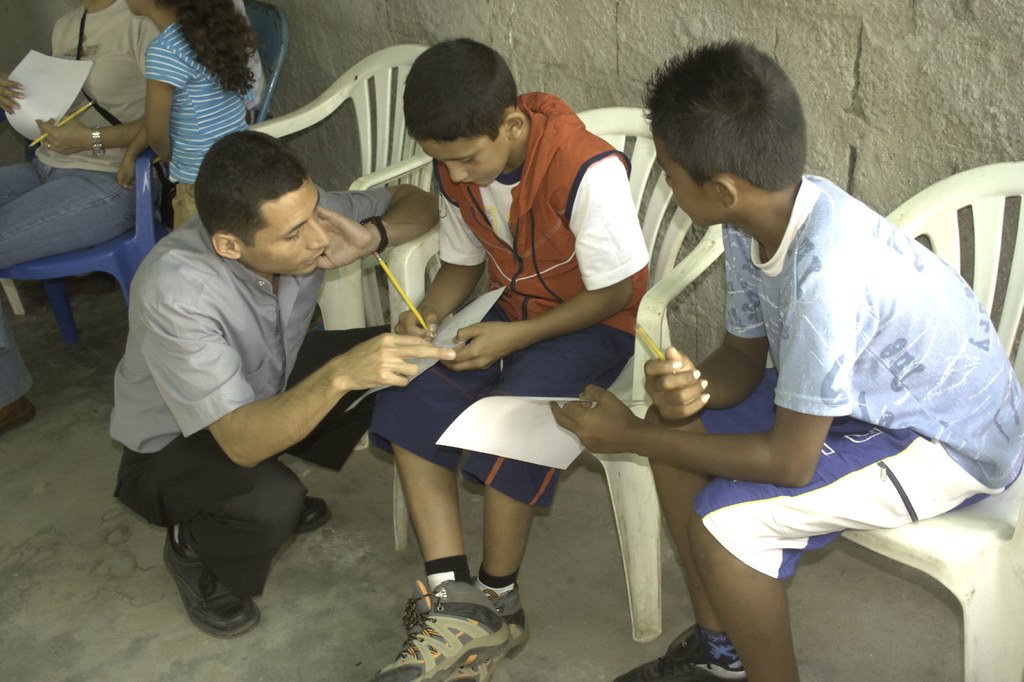
The preschool children chose Gaudis Saray Rangel Rosales as their Queen of the Carnaval for 2009. Every year we have a Carnaval party on the Friday before Ash Wednesday because what follows is a four-day weekend, in which schools, businesses and other institutions are closed. "Carnaval" is derived from a medieval Latin phrase that means "farewell to the flesh", and the four days of Carnaval are supposed to provide a last chance for partying before the beginning of Cuaresma, or Lent. Supposedly everyone will be fasting and avoiding meat and other fleshly pleasures during Lent (if you believe that, I have some ocean-front property in Arizona that might interest you).
Carnaval in Venezuela is characterized by parades, street parties and pranksters throwing water-filled balloons at passing traffic. Every parade must have a queen to lead it. We choose our queen with a simple show of hands, but often the selection of a Carnaval queen is a fullblown beauty pageant. This type of contest is serious business in Venezuela. It is a matter of national pride that Venezuelans have won more international beauty pageants than women from any other country.
Winners of the national Miss Venezuela pageant have won the Miss Universe contest five times, Miss Universe five times (including Miss Universe 2008), Miss World five times, and Miss International five times. Alexandra Braun Waldeck, who won Venezuela's first Miss Earth title in 2005, was first runner-up at the Miss Venezuela pageant.
Between 1983 and 2003, Miss Venezuela placed in the Miss Universe semifinals each consecutive year, and placed in the top six or higher every year from 1991 to 2003. This streak was ended in 2004 when Ana Karina Áñez was not chosen as a semifinalist at Miss Universe 2004. Venezuela has also twice held the Miss Universe and Miss World titles simultaneously: in 1981-1982 with Irene Saez (Miss Universe) and Pilin Leon (Miss World), and again in 1995-1996 with Alicia Machado (Miss Universe) and Jacqueline Aguilera (Miss World).
Some Miss Venezuela competitors have achieved success in other national pageants. Natascha Börger became the first Venezuelan to switch countries, when she won the Miss Deutschland title in 2002 after placing 14th at Miss Venezuela 2000. She went on to place sixth at Miss Universe 2002 behind Miss Venezuela Cynthia Lander. In 2006, Francys Sudnicka, who placed in the top 10 representing the state of Trujillo in Miss Venezuela 2003, won the Miss Poland Universe title. She represented Poland at Miss Universe 2006. Three Venezuelans who won the Miss Italia nel Mondo (Miss Italy in the World) pageant placed in the final five of Miss Venezuela.
 Nevertheless, we do not emphasize competition in our selection of a queen. The point of our Carnaval party gives the children the opportunity to dress up in colorful costumes and spend some time with their parents, many of whom attend. Genesis Marquina came as a cat and another girl wore a rabbit suit this year. After enjoying some games and refreshments, the children march around the neighborhood blowing whistles. They also distributed about 50 tracts from Cristo Para Todas Las Naciones (CPTLN or the Spanish Lutheran Hour).
Nevertheless, we do not emphasize competition in our selection of a queen. The point of our Carnaval party gives the children the opportunity to dress up in colorful costumes and spend some time with their parents, many of whom attend. Genesis Marquina came as a cat and another girl wore a rabbit suit this year. After enjoying some games and refreshments, the children march around the neighborhood blowing whistles. They also distributed about 50 tracts from Cristo Para Todas Las Naciones (CPTLN or the Spanish Lutheran Hour).Due to drastic worldwide budget cuts by Lutheran Hour Ministries, CPTLN activities in Venezuela have been greatly diminished. The organization's headquarters has been moved from Caracas to the much smaller city of Valencia. Longtime director Dr. Jaime Paredes resigned and passed administration of CPTLN in Venezuela to a nephew. That is about all we have heard, although we continue to occasionally receive packages of CPTLN tracts.

The story of Samuel
The following Saturday, February 21, we brought five young people from La Caramuca to a one-day vacation Bible school at Corpus Christi Lutheran Church in Barinas. We had visiting teachers from Barquisimeto, Sandra and Francisco Mania, and Pastor Miguelangel Perez. Pastor Eduardo Flores also was on hand. There was a total of 12 young people in attendance.
The theme was the birth and childhood of the prophet Samuel. We began by discussing how God answered Hannah's prayer for a son (like Isaac, Samson and John the Baptist, Samuel will be a son born to a previously barren woman) and looking at the Song of Hannah in 1 Samuel 2:1-10. The Song of Hannah is a poem inserted into the prose narrative of 1 Samuel. In synagogues to this day this passage is read every year on the first day of Rosh Hashana, the Jewish New Year celebration.
The Song of Hannah follows the characteristic patten of an Israelite hymn:
- An introductory summary;
- Praise of the Lord as Creator of the universe;
- A confession of confidence in Him who will judge the entire world and send His Messiah.
The Song of Hannah foreshadows the Magnificat, or Song of Mary, in Luke 1:46-55. Like Hannah, Mary praises the Lord for the gift that He has implanted in her womb. It was not only a personal blessing for her, but for Israel and all nations, and for that, "all generations shall call me blessed." Also, like the Song of Hannah, the Magnificat plays on the theme of reversals; God shall humble the proud and exalt the humble, show mercy to the righteous and judge the wicked.
The Song of Hannah was used to explain to the young people why hymns used in liturgical worship are structured the way they are. The point of singing hymns is not to make ourselves feel good, but to glorify God and proclaim His message of salvation.
I often think of this as I struggle to learn guitar chords. Alonso's assignment to Corpus Christi ends this month and he has done so much to teach music both to the young people and the congregation as a whole. For example, he has taught the congregation to sing "Sostenos firmes, oh Señor" ("Lord, Keep Us Steadfast In Thy Word") as a round, which is very beautiful. We certainly will miss him when he's gone.
After the Song of Hannah, we focused on the story of Samuel as a boy in the temple and how the Lord called to him (1 Samuel 3:1-4:1. We emphasized how even a young person might be called to serve the Lord, even in a difficult task (in the case of Samuel, it was to announce God's judgment against the high priest Eli and his corrupt sons).

After the lessons, the young people enjoyed themselves, playing games in the street.
Imposition of ashes
We had an attendance of about 15 people for the Ash Wednesday evening service, which was quite good when you consider a) the total membership is no more than 30; and b) Ash Wednesday, unlike the days of Carnaval, is not a national holiday in Venezuela. We followed the Order of Public Confession in Culto Cristiano (much the same as in the 1941 Lutheran Hymnal), but added in the imposition of ashes (definitely not in TLH, but I understand there is an order of service for it in the new Lutheran Service Book).
The practice of wearing sackcloth and sprinkling oneself with ashes to express sorrow and/or repentance of sin dates back to ancient times. The ritual of beginning the season of Lent with everyone receiving the mark of the cross in ashes on one's forehead seems to have originated in the 12th Century. Before that, the imposition of ashes was reserved only for those who had fallen away from the church through grave public sin (murder, adultery, etc.) and wished reconciliation. During the time of the Reformation, Lutherans retained Ash Wednesday as the beginning the 40 days of Lent, but the imposition of ashes ritual fell into disuse, for reasons that are not entirely clear. Recently there has been a revival of the ritual in Lutheran circles, including the Lutheran Church of Venezuela but it is not considered mandatory for everyone to participate.
As practiced here, everyone who so desires may write down on a piece of paper some specific sin of which they wish to repent. Then the pieces of paper are burned to produce the ashes. (I have heard elsewhere that the tradition is to burn palms from the previous Palm Sunday.)
Receiving the imposition of ashes certainly is consistent with our understanding of Lent as a time of repentance and reflexion on the suffering and death of Christ on the cross for our sins. Luz Maria and I wish all of you a blessed Lent in anticipation of an even more blessed Easter.
No comments:
Post a Comment